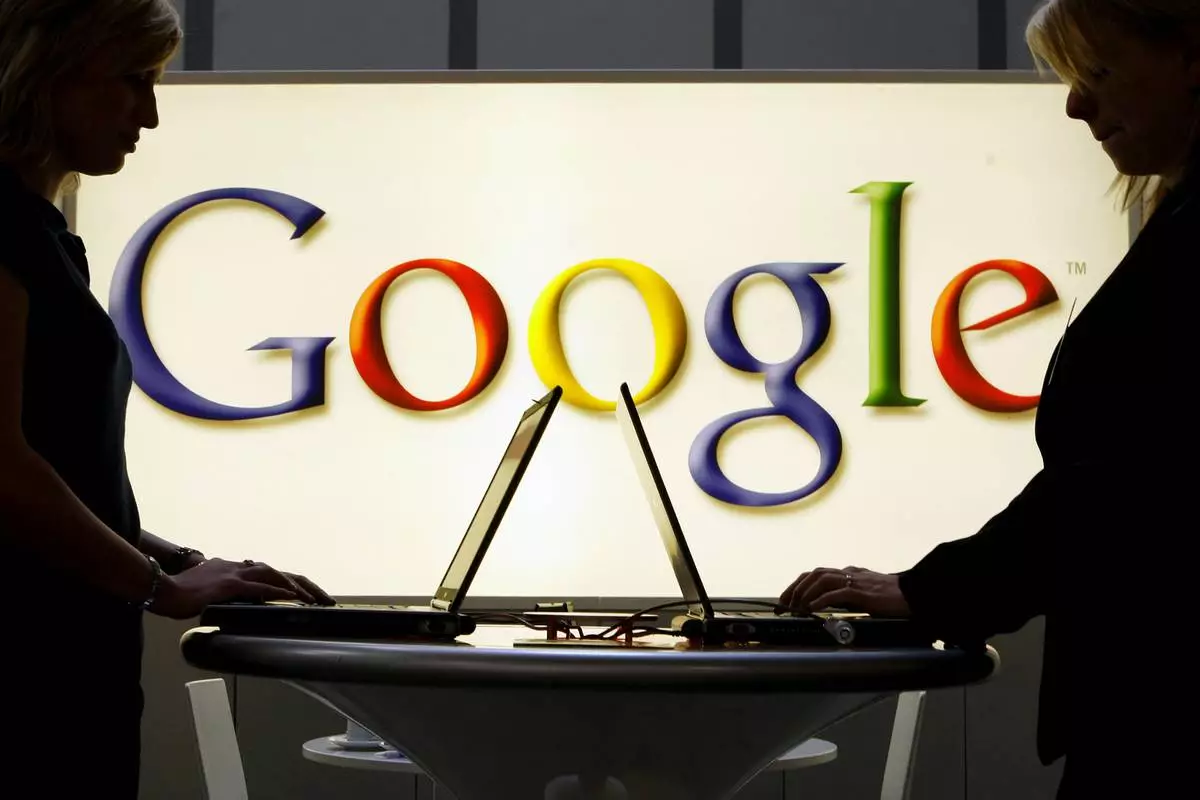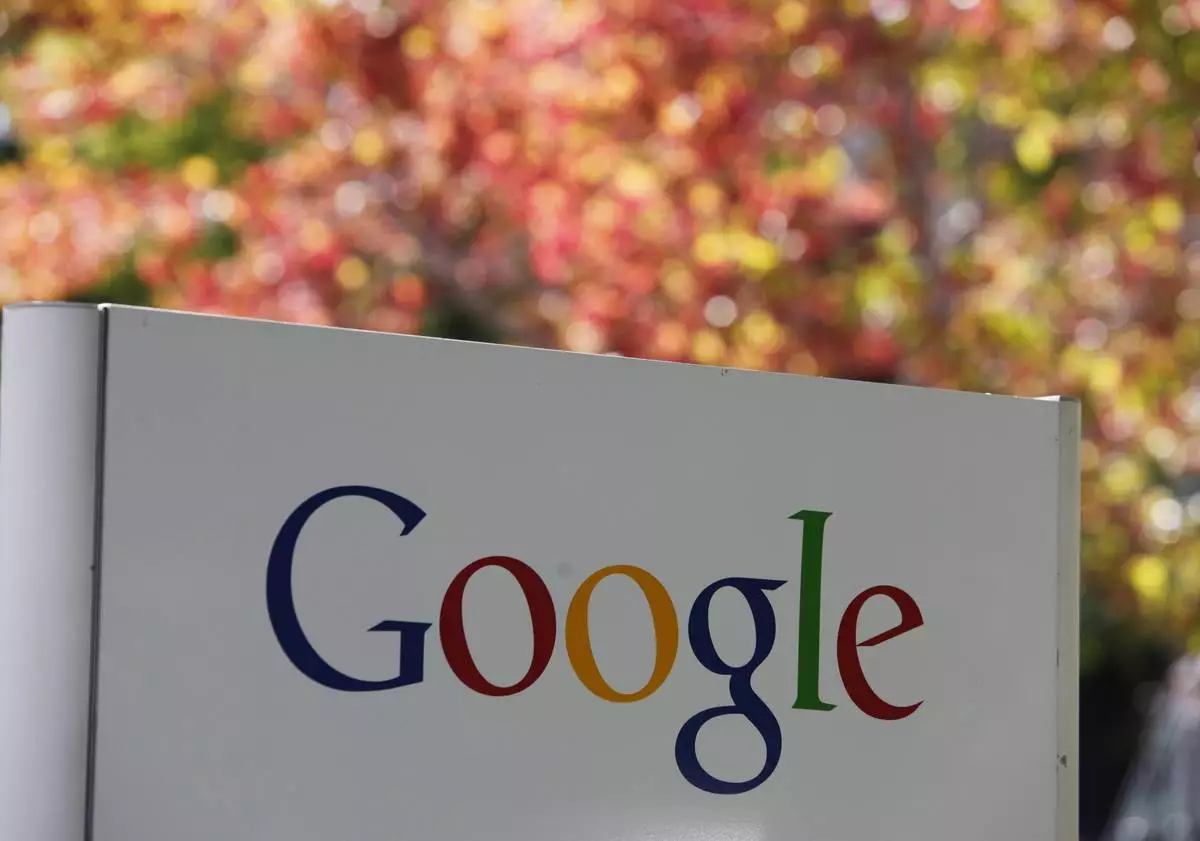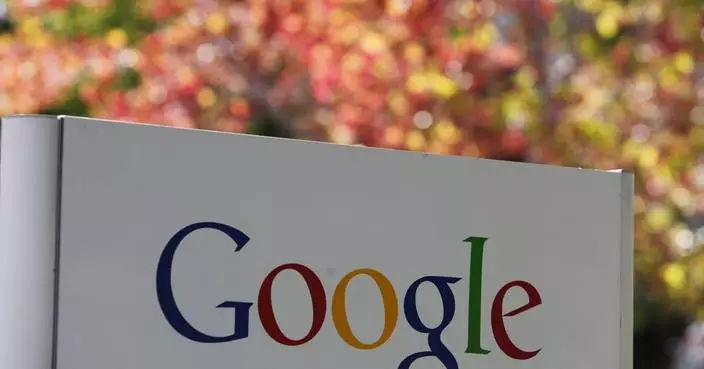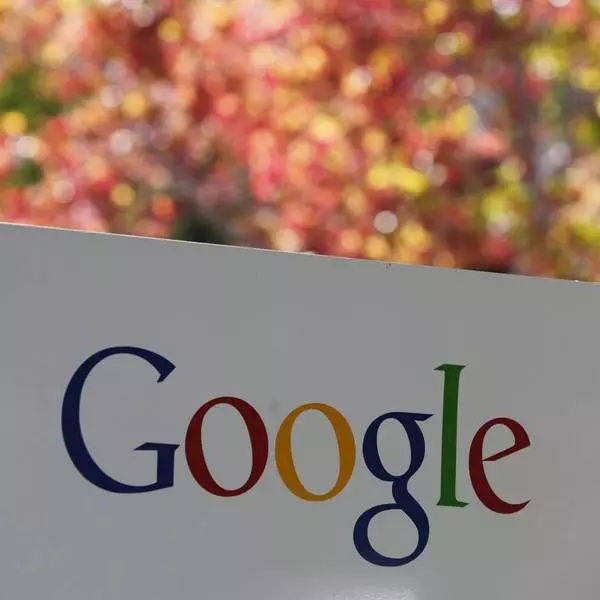LONDON (AP) — Google lost its last bid to overturn a European Union antitrust penalty, after the bloc's top court ruled against it Tuesday in a case that came with a whopping fine and helped jumpstart an era of intensifying scrutiny for Big Tech companies.
The European Union’s top court rejected Google's appeal against the 2.4 billion euro ($2.7 billion) penalty from the European Commission, the 27-nation bloc’s top antitrust enforcer, for violating antitrust rules with its comparison shopping service.
Also Tuesday, Apple lost its challenge against an order to repay 13 billion euros ($14.34 billion) in back taxes to Ireland, after the European Court of Justice issued a separate decision siding with the commission in a case targeting unlawful state aid for global corporations.
Both companies have now exhausted their appeals in the cases that date to the previous decade. Together, the court decisions are a victory for European Commissioner Margrethe Vestager, who's expected to step down next month after 10 years as the commission's top official overseeing competition.
Experts said the rulings illustrate how watchdogs have been emboldened in the years since the cases were first opened.
One of the takeaways from the Apple decision "is the sense that, again, the EU authorities and courts are prepared to flex their (collective) muscles to bring Big Tech to heel where necessary,” Alex Haffner, a competition partner at law firm Fladgate, said by email.
The Google ruling “reflects the growing confidence with which competition regulators worldwide are tackling the perceived excesses of the Big Tech companies,” said Gareth Mills, partner at law firm Charles Russell Speechlys. The court's willingness “to back the legal rationale and the level of fine will undoubtedly embolden the competition regulators further.”
The shopping fine was one of three huge antitrust penalties for Google from the commission, which punished the Silicon Valley giant in 2017 for unfairly directing visitors to its own Google Shopping service over competitors.
“We are disappointed with the decision of the Court, which relates to a very specific set of facts,” Google said in a brief statement.
The company said it made changes to comply with the commission’s decision requiring it to treat competitors equally. It started holding auctions for shopping search listings that it would bid for alongside other comparison shopping services.
“Our approach has worked successfully for more than seven years, generating billions of clicks for more than 800 comparison shopping services,” Google said.
European consumer group BEUC hailed the court's decision, saying it shows how the bloc's competition law “remains highly relevant" in digital markets.
“It is a good outcome for all European consumers at the end of the day,” Director General Agustín Reyna said in an interview. “It means that many smaller companies or rivals will be able to go to different comparison shopping sites. They don’t need to depend on Google to reach out to customers."
Google is still appealing its two other EU antitrust cases: a 2018 fine of 4.125 billion euros ($4.55 billion) involving its Android operating system and a 2019 penalty of 1.49 billion euros ($1.64 billion) over its AdSense advertising platform.
Those three cases foreshadowed expanded efforts by regulators worldwide to crack down on the tech industry. The EU has since opened more investigations into Big Tech companies and drew up a new law to prevent them from cornering online markets, known as the Digital Markets Act.
European Commissioner and Executive Vice President Margrethe Vestager said that the shopping case was one of the first attempts to regulate a digital company and inspired similar efforts worldwide.
"The case was symbolic because it demonstrated even the most powerful tech companies could be held accountable. No one is above the law,” Vestager told a press briefing in Brussels.
Vestager said the commission will continue to open competition cases even as it enforces the Digital Markets Act. The DMA is a sweeping rulebook that forces Google and other tech giants to give consumers more choice by following a set of dos and don'ts.
Google is also now facing pressure over its lucrative digital advertising business from the EU and Britain, which are carrying out separate investigations, and the United States, where the Department of Justice is taking the company to federal court over its alleged dominance in ad tech.
Apple failed in its last bid to avoid repaying its Irish taxes Tuesday after the Court of Justice upheld a lower court ruling against the company, in the dispute that dates back to 2016.
Vestager, who said she had been braced for defeat, hailed it as a landmark victory for “tax justice.”
It was a surprise win for the commission, which has previously targeted Amazon, Starbucks and Fiat with tax rulings that were later overturned on appeal. They were part of the EU's efforts to stamp out sweetheart deals that let companies pay little to no taxes in a fight that highlighted the debate over whether multinational corporations are paying their fair share around the world.
The case drew outrage from Apple, with CEO Tim Cook calling it “total political crap.” Then-U.S. President Donald Trump slammed Vestager, who spearheaded the campaign to root out special tax deals and crack down on big U.S. tech companies, as the “tax lady” who “really hates the U.S.”
Associated Press writers Raf Casert and Mark Carlson in Brussels contributed to this report.

FILE - In this April 17, 2007 file photo, exhibitors work on laptop computers in front of an illuminated sign of the Google logo at the industrial fair Hannover Messe in Hanover, Germany. (AP Photo/Jens Meyer, File)

FILE - A sign at Google headquarters in Mountain View, Calif. is shown on Oct. 8, 2010. (AP Photo/Paul Sakuma, File)

Google loses final EU court appeal against 2.4 billion euro fine in antitrust shopping case

Google loses final EU court appeal against 2.4 billion euro fine in antitrust shopping case
PANAMA CITY (AP) — They crossed oceans to get to the U.S., fleeing conflict, religious persecution, poverty and government crackdowns in countries such as Afghanistan, Somalia, Cameroon, China, Pakistan and Iran.
After flying to Central and South America, they bused through countries where they didn’t speak the language and walked through unfamiliar jungle to get to the U.S.-Mexico border.
Within days, they were detained and put on military aircraft that flew nearly 300 of them to Panama as U.S. President Donald Trump sought to accelerate deportations to more complicated destinations.
Panama was supposed to be a stopover. But for those unwilling to return home — mostly out of well-founded fear — Panama sent them to a guarded camp without access to lawyers in the same Darién jungle many had crossed months earlier on their way north.
Over the past week, under legal pressure, the Panamanian government dropped them off at a bus station in the capital with 30 days to figure out where they will go next.
“It feels like the whole world is crushing down on me. It’s like everything is stopping,” said Isha Len, a 29-year-old from Cameroon. “I risked everything, my life, everything, crossing the Darién Gap, just to be sent back.”
Here are the stories that some of the deportees told The Associated Press:
After conflict broke out in her small town, Len crossed Cameroon by car and minibus, then a fisherman friend carried her four hours by boat to Nigeria.
Len, a schoolteacher, flew to Sao Paulo, Brazil, where she said authorities detained her for a month in the airport. From there, she wound north through South America by bus, following other migrants until they reached the Darién Gap.
She walked days through the dangerous jungle that divides Colombia and Panama before boarding buses that carried her through Central America. After being kidnapped for days by a gang in Guatemala, she crossed into southern Mexico, where she took a boat along the Pacific coast to evade authorities. After she landed, she rode eight hours to Mexico City, continuing on by bus and car to Tijuana.
She crossed the U.S. border and presented herself to American authorities.
Artemis Ghasemzadeh left her country in January, fleeing after converting from Islam to Christianity – something that could cost Ghasemzadeh her life in Iran. She flew to Dubai, where she stayed two weeks and then took a flight to South Korea.
From there she flew to Mexico City, staying there for three weeks before going to Tijuana. She crossed the U.S. border on Feb. 9, and was detained for five days, including her birthday.
“For changing your religion, your punishment is death," she said. “We don’t know what will happen."
Wang Qiu said he left home after he was imprisoned for three years for speaking out about democracy and human rights issues.
He flew from Beijing to Cuba, then to the small South American country of Suriname. From there, he traveled by land: through Guyana, Brazil, Bolivia, Peru, Ecuador and Colombia, before trekking through the Darién Gap.
He moved up through Central America and Mexico before being detained after crossing into the U.S. in San Diego.
Qamar Abdi, left for the U.S. on Aug. 17, due to warfare between the government and militants of al-Shabab, which the U.S. recognizes as a terrorist group.
She hopped from buses to shared cars for nearly a month until she reached South Africa. From there, she flew to Sao Paulo, Brazil, and spent the next six months riding buses north.
When she arrived at the northern tip of Colombia, she traveled six days through the Darién Gap, landing in Panama on New Year's Day.
She took buses to the southern Mexican border city of Tapachula, where she was temporarily kidnapped and robbed by a gang. To avoid immigration authorities, she traveled hours packed on a boat with other migrants along Mexico's Pacific coast, then took a bus to Mexico City. She spent two weeks there before driving to Tijuana, where she crossed into the U.S.
Ebrahim Ghezelgechi fled Iran with his wife, Sahar; 10-year-old daughter, Aylin; and 11-year-old son, Sam, on Nov. 21.
The family flew to Brazil, then to Panama and finally Nicaragua. From there, they took buses north to Guatemala, then crossed into southern Mexico by boat. They rode on top of trains and in buses and vans to get to Tijuana.
After Mexico authorities sent them back to the southern part of the country, they took a plane to the resort area of Los Cabos. There, they were detained, had their passports taken and were sent back south again.
They tried getting north a number of times, punted back by Mexican authorities, before eventually paying a driver to take them to Tijuana.
After crossing into the U.S., they were detained in San Diego for a week.
Samin Haider left for Dubai in 2023 after violence surged in his region of Parachinar, which borders Afghanistan and has been plagued for decades by conflicts between Shi’ite and Sunni Muslim communities.
Haider was there for 1 1/2 years before the United Arab Emirates canceled visas for Pakistanis.
Haider then flew to Mexico and traveled to the U.S.-Mexico border with the hopes of seeking asylum.
Now deported to Panama, he still hopes to reach the U.S.
Elham Ghaedi left on Oct. 21, flying to Brazil and then to Venezuela's capital Caracas.
She traveled to Colombia, where took a bus north and then walked five days through the Darién Gap.
She stayed 15 days in a migrant camp in southern Panama before taking a bus through Costa Rica, Nicaragua, Honduras, Guatemala and to Mexico's southern border. There, migration authorities detained her for six days.
She traveled north to Mexico City, where she spent a month, before boarding a flight to Tijuana. U.S. authorities detained her when she crossed to San Diego.
Omagh fled Afghanistan in 2022 after the takeover of the Taliban because he identified as an atheist and was part of an ethnic minority, something that could put his life in danger.
He first went to Pakistan, where he got a visa for six months, and struggled to get a new one due to his Afghani passport.
He then went to Iran and worked there for 1 1/2 years. But the country wouldn’t accept him as a refugee.
He managed to get a visa to Brazil, which offered a number of Afghan people refuge after the rise of the Taliban, and flew to Sao Paulo in 2024.
Hoping to reunite with friends and family in the U.S., Omagh paid smugglers to move him north through Bolivia, Peru, Ecuador and Colombia. He trekked through the Darién Gap, then took buses north through Central America to southern Mexico.
Mexican authorities detained him and dropped him back in southern Mexico a few times before he managed to take a flight to Mexico City and later to the U.S., where he was detained.
“After so much time, I’ve lost hope,” he said.

Afghan migrant Hayatullah Omagh poses for a portrait in Panama City, Monday, March 10, 2025, after being deported from the United States, detained for weeks in a Panamanian immigration camp and released on a temporary humanitarian visa allowing a 30‑day stay. (AP Photo/Matias Delacroix)

Elham Ghaedi, a migrant from Iran, poses for a portrait in Panama City, Monday, March 10, 2025, after being deported from the United States, detained for weeks in a Panamanian immigration camp, and released on a temporary humanitarian visa allowing a 30‑day stay. (AP Photo/Matias Delacroix)

Samin Haider, left, a migrant from Pakistan, and his cousin Saqlain Sayed, pose for a portrait in Panama City, Monday, March 10, 2025, after being deported from the United States, detained for weeks in a Panamanian immigration camp, and released on a temporary humanitarian visa allowing a 30‑day stay. (AP Photo/Matias Delacroix)

Ebrahim Ghezelgechi, right, a migrant from Iran, poses for a portrait with his wife Sahar Bideman and their children Sam and Aylin in Panama City, Monday, March 10, 2025, after they were deported from the U.S., detained for weeks in a Panamanian immigration camp, and released on a temporary humanitarian visa allowing a 30‑day stay. (AP Photo/Matias Delacroix)

Qamar Abdi and Filsan Aliin, migrants from Somalia, pose for a portrait at the hotel where they are staying in Panama City, Monday, March 10, 2025, after being deported from the United States, detained for weeks in a Panamanian immigration camp, and released on a temporary humanitarian visa allowing a 30‑day stay. (AP Photo/Matias Delacroix)

Wang Qiu, a migrant from China, poses for a portrait in Panama City, Tuesday, March 11, 2025, after being deported from the United States, detained for weeks in a Panamanian immigration camp, and released on a temporary humanitarian visa allowing a 30‑day stay. (AP Photo/Matias Delacroix)

Artemis Ghasemzadeh, a migrant from Iran, poses for a portrait in Panama City, Monday, March 10, 2025, after being deported from the United States, detained for weeks in a Panamanian immigration camp, and released on a temporary humanitarian visa allowing a 30‑day stay. (AP Photo/Matias Delacroix)

Isha Len, a migrant of Cameroon, poses for a photo in Panama City, Monday, March 10, 2025, after being deported from the U.S., detained for weeks in a Panamanian immigration camp, and released on a temporary humanitarian visa allowing a 30‑day stay. (AP Photo/Matias Delacroix)

Migrants who were held in a Panamanian immigration shelter after being deported from the U.S. embraced upon arriving in Panama City on Saturday, March 8, 2025, after authorities gave them 30 days to leave the country. (AP Photo/Matias Delacroix)






















